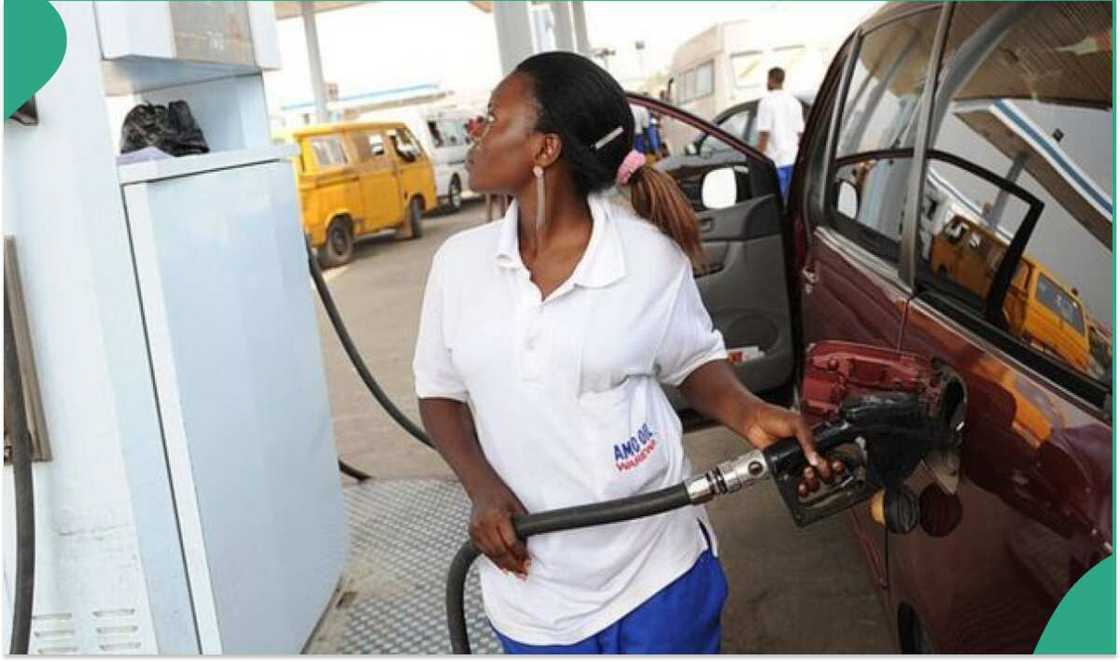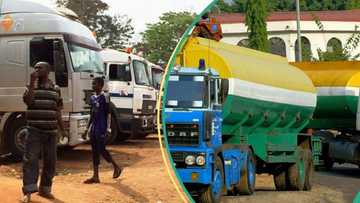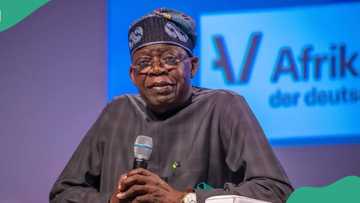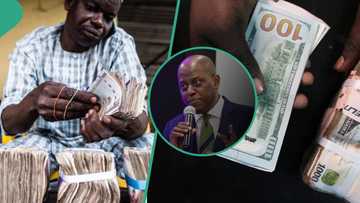N1,000/litre: Petrol Landing Cost Hits New Record After Naira to Dollar Rate Crosses Over N1,500
- The new landing cost of petrol is now estimated at N1,000 per litre as a result of worsening foreign exchange
- This occurred after the naira crossed over N1,500 to the dollar on Monday in both the official and unofficial market
- Analysts said that the government only reduced subsidy but is yet to eliminate it to ease the affairs of Nigerians
PAY ATTENTION: The 2024 Business Leaders Awards Present Entrepreneurs that Change Nigeria for the Better. Check out their Stories!
Legit.ng journalist Zainab Iwayemi has over three years of experience covering the Economy, Technology, and Capital Market.
As Nigeria's foreign exchange crisis worsened, the landing cost of imported petrol exceeded N1,000 per litre.

Source: UGC
Findings by BusinessDay indicated that the landing cost of gasoline—which includes the product's foreign pricing, transportation, insurance, and other charges—rose to N1,009/litre in October 2023 from N720/litre at the black-market rate of N1,500 per dollar.

Read also
Looming fuel scarcity as tanker drivers threaten to stop lifting petrol, announce shutdown date
According to data from the FMDQ, the naira lost 4.19% of its value after trading on Monday, February 12.
PAY ATTENTION: Click “See First” under the “Following” tab to see Legit.ng News on your Facebook News Feed!
One dollar was quoted at N1,534.39, compared to N1,469.97 on Friday at the Nigerian Autonomous Foreign Exchange Market.
Legit.ng earlier reported that the black market, or parallel market, saw a 1.33% depreciation of the naira as well. On Monday, the dollar's value was N1,505, down from N1,485 on Friday.
Government still financing petrol subsidy
Analysts believe the government is still quietly subsidising petrol to ease the hardship already faced.
A senior executive in the downstream sector said:
“The rising landing cost of petrol results from the rising FX crisis. There are interventions in the market through subsidies as most Nigerians cannot afford the market price for petrol.”

Read also
Petrol subsidy nears N1 trillion, higher than Buhari's era as NNPC finally speaks on 'new' price
Bismarck Rewane, chief executive officer of the Financial Derivatives Company, said:
“The truth is that subsidy has been reduced. If the subsidy has been removed, then the price of PMS as you see it today will be much higher than what it is.”
According to Aisha Mohammed, an energy analyst at the Centre for Development Studies in Lagos, the government partially subsidises the commodity for social, political, and economic reasons.
She said:
“All of us who were saying that they should remove the subsidy, we can see that they have partially removed it now, but look at the consequences. Economically, it will sound good, but socially and politically, it is very costly.”
Additional research revealed that the N1,009 landing fee does not include other distribution costs, vessel charges, Nigerian Maritime Administration and Safety Agency charges, or charges from the Nigerian Ports Authority, as some are charged in dollars.

Read also
Naira hits N1,600/$, CBN reacts, gives fresh orders to Access, UBA, others on dollar sale to customers
A source said:
“We must resist the dollarisation of the Nigerian economy; there are some fee collections in dollars that are also pushing up the landing cost of petrol.”
Oil marketers speculate new petrol price
Legit.ng also reported that the national public relations officer of the Independent Petroleum Marketers Association of Nigeria (IPMAN) stated that the price of petrol might rise following the naira crash against the dollar.
IPMAN's spokesman, Ukadike Chinedu, said it is likely that Nigerians may see a hike in the price of the commodity as inflation and scarcity of Forex persist.
The development comes as the Nigerian government revealed on Wednesday, January 31, 2024, that the Port Harcourt Refinery was still undergoing a test run and that products from the facility would soon hit the market.
PAY ATTENTION: Donate to Legit Charity on Patreon. Your support matters!
Source: Legit.ng


